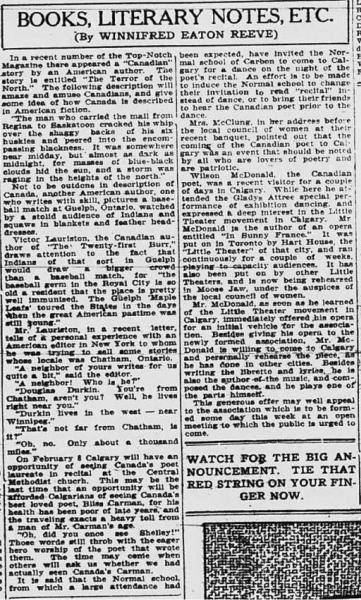In a recent number of the Top-Notch Magazine there appeared a “Canadian” story
by an American author. The story is entitled “The Terror of the North.” The
following description will amaze and amuse Canadians, and give some idea of how
Canada is described in American fiction.
“The man who carried the mall from Regina to Saskatoon cracked his whip over the
shaggy backs of his six huskies and peered into the encompassing blackness. It was
somewhere near midday, but almost as dark as midnight, for masses of blue-black
clouds hid the sun, and a storm was raging in the heights of the north.”
Not to be outdone in description of Canada, another American author, one who writes
with skill, pictures a baseball match at Guelph, Ontario, watched by a stolid
audience of Indians and squaws in blankets and feather headdresses.
Victor Lauriston, the Canadian author of
“The
Twenty-first Burr,” draws attention to the fact that Indians of that sort in
Guelph would draw a bigger crowd than a baseball match, for
“the baseball germ in
the Royal City is so old a resident that the place is pretty well immunised. The
Guelph ‘Maple Leafs’ toured the States in the days when the great American pastime
was still young.”
Mr. Lauriston, in a recent letter, tells of a personal
experience with an American editor in New York to whom he was trying to sell some
stories whose locale was Chatham, Ontario.
“A neighbor of yours writes for us quite a bit,” said the editor.
“A neighbor! Who is he?”
“Douglas Durkin. You’re from Chatham, aren’t you? Well,
he lives right near you.”
“Durkin lives in the west — near Winnipeg.”
“That’s not far from Chatham, is it?”
“Oh, no. Only about a thousand miles.”
On February 8 Calgary will have an opportunity of seeing Canada’s poet laureate in
recital at the Central Methodist church. This may be the last time that an
opportunity will be afforded Calgarians of seeing Canada’s best loved poet,
Bliss Carman, for his health has been poor of late years,
and the traveling exacts a heavy toll from a man of Mr. Carman’s age.
“Oh, did you once see Shelley!” Those words still throb with the eager hero
worship of the poet that wrote them. The time may come when others will ask us
whether we had actually seen Canada’s Carman.
It is said that the Normal school, from which a large attendance had been expected,
have invited the Normal school of Carbon to come to Calgary for a dance on the night
of the poet’s recital. An effort is to be made to induce the Normal school to change
their invitation to read “recital” instead of dance, or to bring their friends
to hear the Canadian poet prior to the dance.
Mrs. McClung, in her address before the local council of women at their recent
banquet, pointed out that the coming of the Canadian poet to Calgary was an event
that should be noted by all who are lovers of poetry and are patriotic.
Wilson McDonald, the Canadian poet, was a recent visitor
for a couple of days in Calgary. While here he attended the Gladys Attree special
performance of exhibition dancing, and expressed a deep interest in the Little
Theater movement in Calgary.
Mr. McDonald is the author
of an opera entitled
“In Sunny France.” It was put on in Toronto by Hart House,
the
“Little Theater” of that city, and ran continuously for a couple of weeks,
playing to capacity audiences. It has also been put on by other Little Theaters, and
is now being rehearsed in Moose Jaw, under the auspices of the local council of
women,
Mr. McDonald, as soon as he learned of the Little Theater
movement in Calgary, immediately offered his opera for an initial vehicle for the
association. Besides giving his opera ot the newly formed association,
Mr. McDonald is willing to come to Calgary and personally
rehearse the piece, as he has done in other cities. Besides writing the libretto and
lyrics, he is also the author of the music, and composed the dances, and he plays one
of the parts himself.
This generous offer may well appeal to the association which is to be formed some day
this week at an open meeting to which the public is urged to come.
